Embarking on a weight loss journey can feel like a daunting task, filled with ups and downs, victories, and challenges. You’ve probably tried various diets and workout routines, but staying on track can be tough. That’s where a weight loss journal comes in. By meticulously tracking your progress, reflecting on your habits, and staying accountable, a weight loss journal can significantly enhance your journey.
Why a Weight Loss Journal Matters
A weight loss journal is more than just a diary; it’s a powerful tool that helps you stay focused, motivated, and accountable. But why is it so important? Think of it as having a personal coach who tracks your progress, celebrates your victories, and helps you navigate setbacks. Here’s how it can help:
- Visualize Your Progress: Seeing how far you’ve come can be incredibly motivating.
- Identify Patterns: Recognize what works and what doesn’t.
- Stay Accountable: Writing things down makes you more committed to your goals.
- Reflect on Your Journey: Understand your emotions and thoughts related to weight loss.
Rowers can be a very good equipment for Weight Loss Exercise. Have a look at my post- Row Your Way to a Fitter You: 10 Best Sunny Health & Fitness Rowing Machine Review
CHECKOUT OUR WEIGHT LOSS JOURNALS- WEIGHT LOSS JOURNALS BY FIT’nFoodiee
How to Start Your Weight Loss Journal
Starting a weight loss journal is simple and requires minimal supplies. Here’s how you can get started:
- Choose Your Medium: Physical Notebook or Digital Journal? They both have there pros/cons. Physical journals are more personal but digital ones can be easier to get a hold of.
- Set Up Your Journal: Organize your journal into sections such as goals, diet, exercise, and reflections. This will make it easier to navigate and maintain.
- Establish a Routine: Consistency is key. Dedicate a few minutes each day to update your journal.
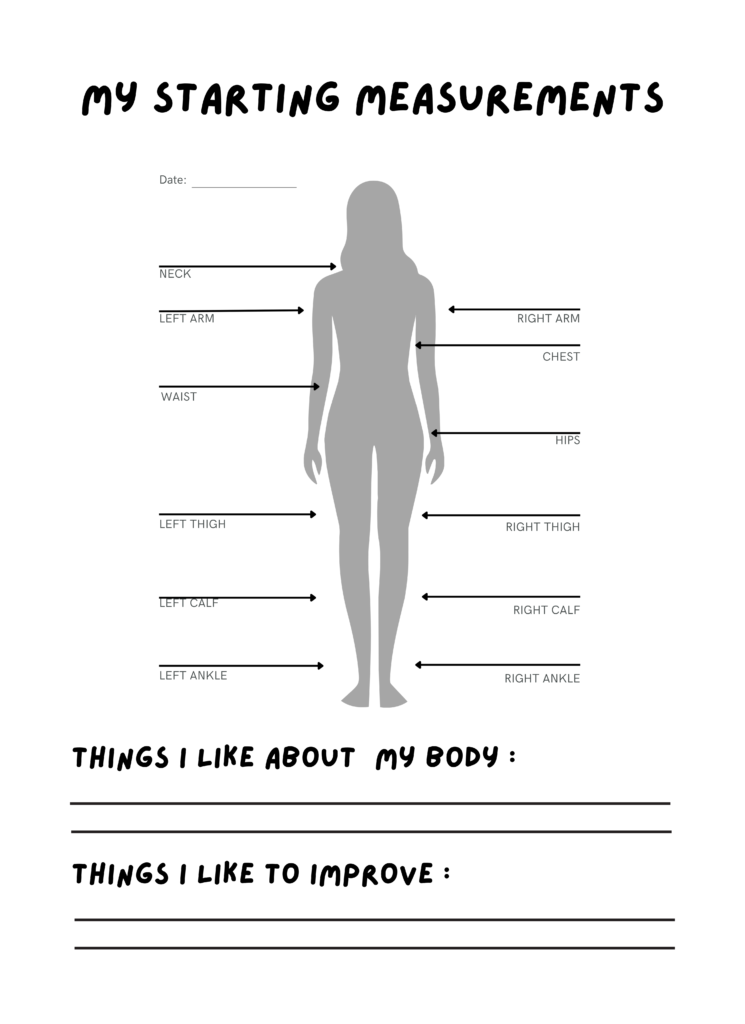
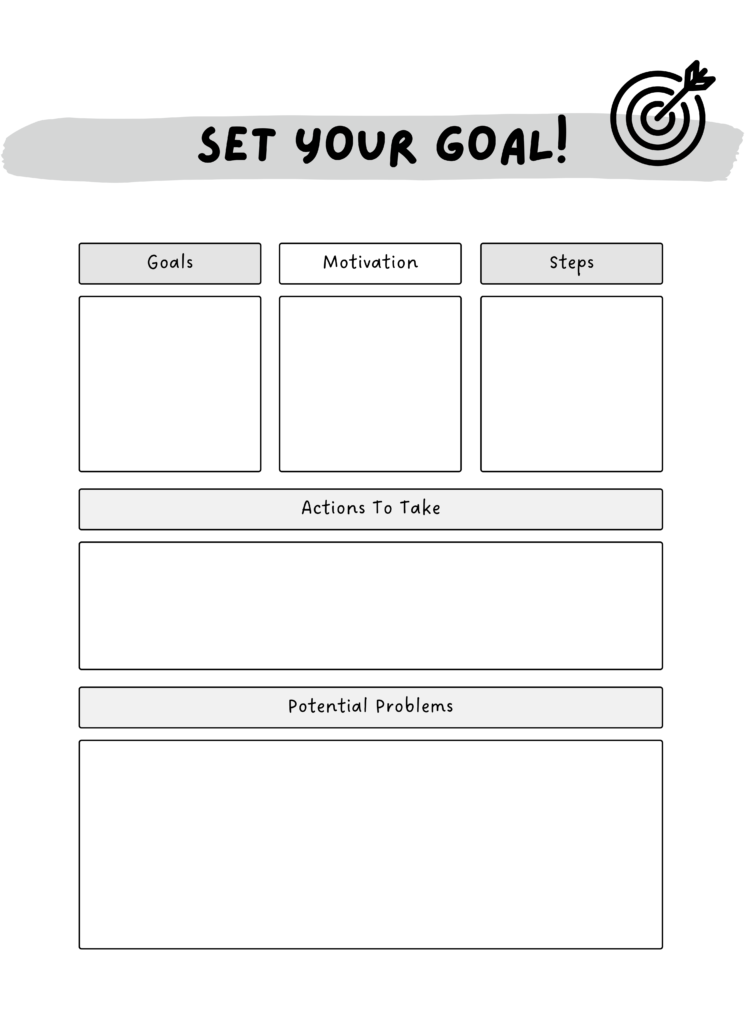
Setting up Goals
CHECKOUT OUR WEIGHT LOSS JOURNALS- WEIGHT LOSS JOURNALS BY FIT’nFoodiee
The following video might help you to understand how to maintain a Weight Loss Journal
Setting Realistic Goals
One of the first steps in using a weight loss journal is setting realistic and achievable goals. Here’s how to do it:
- Be Specific: Instead of saying, “I want to lose weight,” specify how much weight you want to lose and by when.
- Break It Down: Divide your goal into smaller, manageable milestones. This makes the journey less overwhelming.
- Consider Your Lifestyle: Set goals that fit into your daily routine. Unrealistic goals can lead to frustration and burnout.
- Celebrate Small Wins: Acknowledge and celebrate your progress, no matter how small.
Tracking Your Diet
Your diet plays a crucial role in your weight loss journey. Here’s how you can effectively track it:
- Record Everything: Write down everything you eat and drink, including portion sizes. This helps you stay mindful of your consumption.
- Analyze Your Diet: Look for patterns and identify areas for improvement. Are you eating too many snacks? Not enough vegetables?
- Plan Ahead: Use your journal to plan meals and snacks. This can help you make healthier choices and avoid impulsive eating.
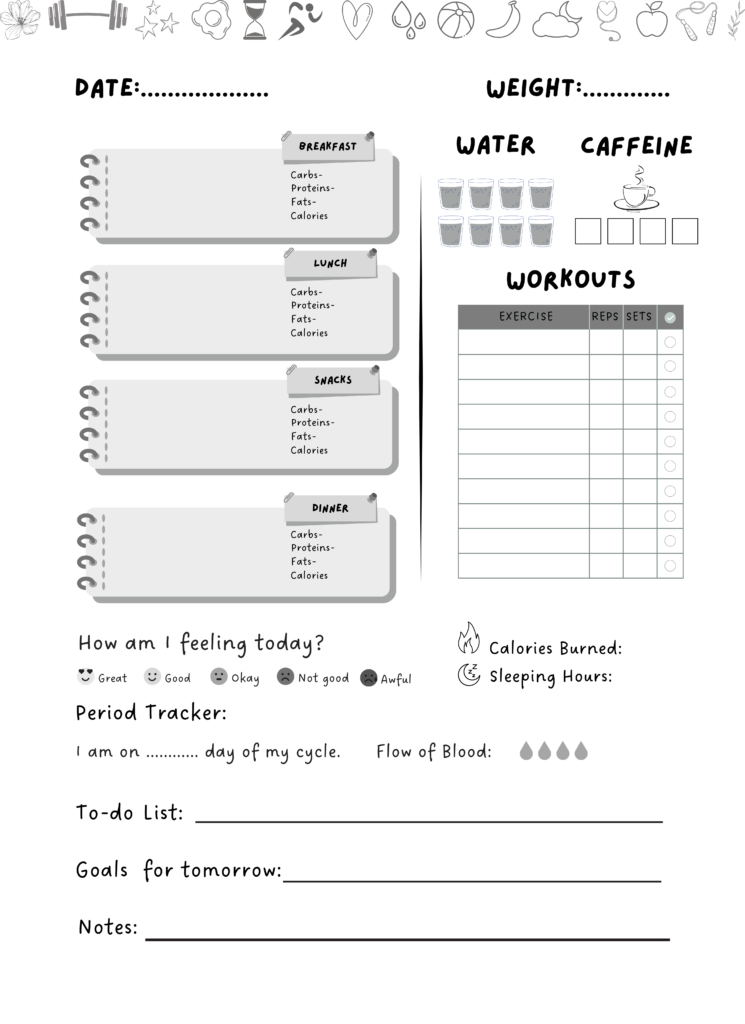
A view of Inside our Book
CHECKOUT OUR WEIGHT LOSS JOURNALS- WEIGHT LOSS JOURNALS BY FIT’nFoodiee
Monitoring Your Exercise Routine
Keeping track of your workouts is just as important as tracking your diet. Here’s how to do it:
- Log Your Workouts: Record the type, duration, and intensity of each workout. Include notes on how you felt before and after.
- Set Fitness Goals: Whether it’s running a certain distance or lifting a specific weight, set clear fitness goals and track your progress.
- Variety Is Key: Mix up your workouts to keep things interesting and prevent plateauing. Your journal can help you plan and track different exercises.
Recording Your Emotions and Thoughts
Weight loss is as much a mental journey as it is a physical one. Here’s why it’s important to record your emotions and thoughts:
- Identify Triggers: Recognize what triggers emotional eating or motivation dips.
- Stay Positive: Use your journal to remind yourself of your strengths and past successes.
- Reflect and Learn: Understand your feelings and thoughts related to weight loss. This self-awareness can be incredibly powerful.
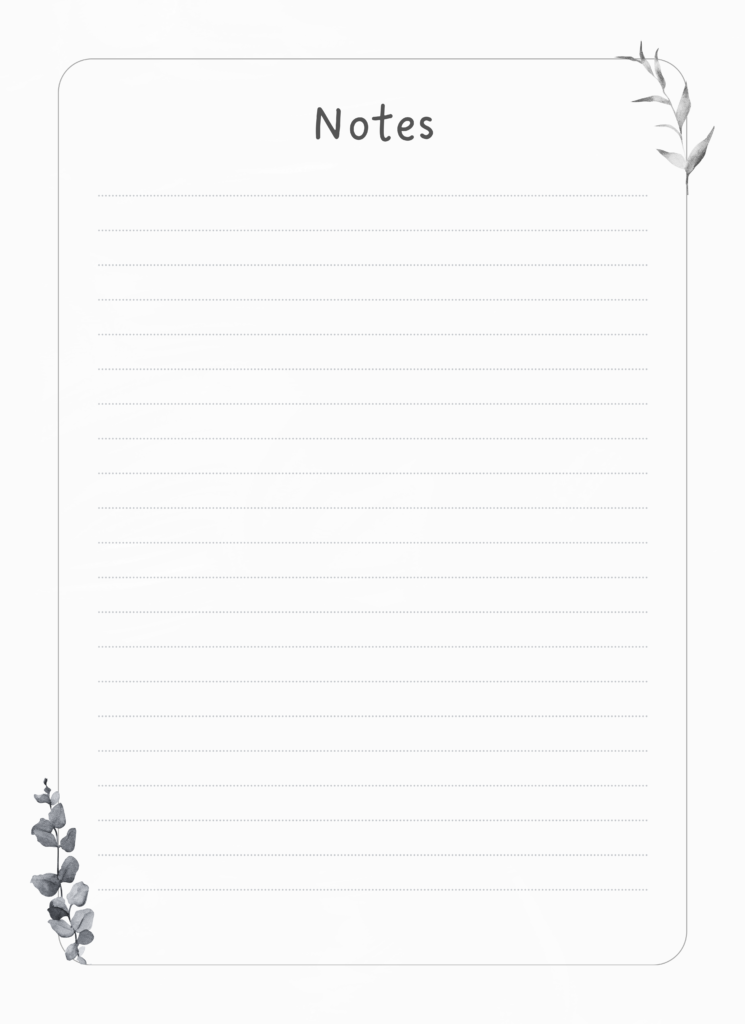
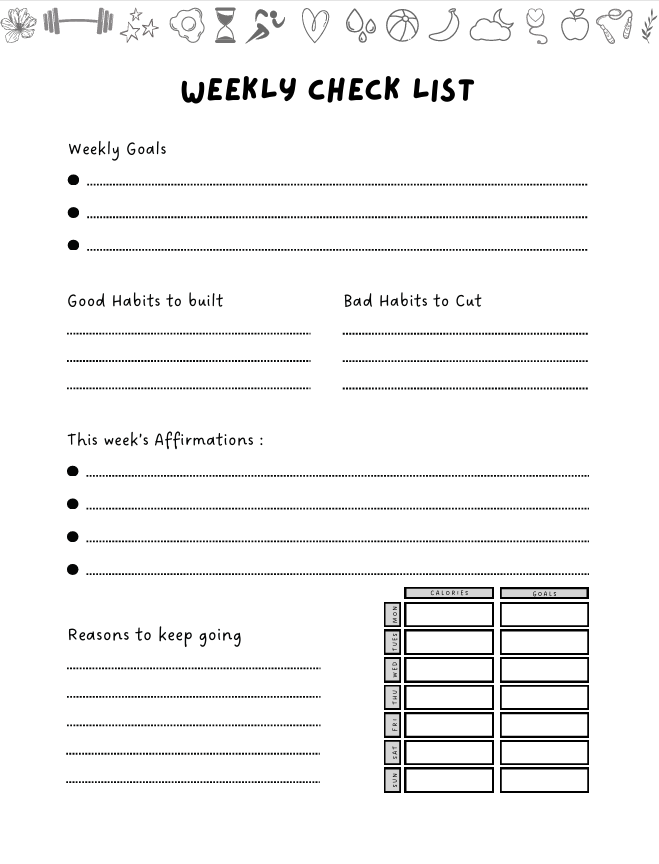
CHECKOUT OUR WEIGHT LOSS JOURNALS- WEIGHT LOSS JOURNALS BY FIT’nFoodiee
Reviewing and Reflecting
Regularly reviewing your journal can provide valuable insights. Here’s how to make the most of it:
- Weekly Reviews: Dedicate time each week to review your entries. Look for patterns, progress, and areas needing improvement.
- Monthly Reflections: Take a broader view each month. Assess your progress towards your goals and adjust your plans as needed.
- Celebrate Milestones: Use these reviews to celebrate your achievements and set new goals.
The Benefits of Keeping a Weight Loss Journal
Accountability
One of the greatest advantages of maintaining a weight loss journal is accountability. By consistently recording your food intake, workouts, and weight changes, you hold yourself responsible for your actions and decisions.
Tracking Progress
Seeing your progress documented can be incredibly motivating. It allows you to celebrate small victories and stay focused on your long-term goals.
Recognizing Patterns
A journal helps you identify patterns in your eating and exercise habits. Do you eat more when you’re stressed? Do you skip workouts when you’re busy? Recognizing these patterns is the first step towards making positive changes.
Boosting Motivation
A weight loss journal serves as a source of motivation and encouragement. When you look back and see how far you’ve come, it can inspire you to keep pushing forward, even when the going gets tough.
Common Mistakes to Avoid
Avoiding common mistakes can help you get the most out of your weight loss journal. Here are some to watch out for:
- Being Inconsistent: Skipping days or weeks can make it harder to track progress and stay motivated.
- Not Being Honest: Be truthful in your entries. Honesty will help you identify areas for improvement.
- Focusing Only on Negatives: Celebrate your successes, no matter how small. This keeps you motivated and positive.
- Overcomplicating Entries: Keep your entries simple and to the point. This makes journaling less daunting and more sustainable.
Have a look at my following post if you are not able to lose weight although you are tring hard-
Sweating but Not Slimming Down? Here’s How to Fix It!
Tips for Effective Journaling
Be Honest and Consistent
Honesty and consistency are crucial. Don’t skip entries, and be truthful about what you eat and how you feel.
Include Detailed Information
The more details you include, the more useful your journal will be. Note portion sizes, how you felt before and after eating, and any physical symptoms.
Practice Positive Reinforcement
Reward yourself for milestones achieved. Positive reinforcement can boost your motivation and keep you on track.
The Impact of a Weight Loss Journal on Mental Health
Enhancing Self-Awareness
Journaling builds self-awareness, helping you understand your habits and thought patterns. This can lead to more mindful eating and better choices.
Reducing Stress and Anxiety
Writing about your experiences and emotions can reduce stress and anxiety, providing a healthy outlet for your feelings.
Personalizing Your Journal
Customizing Your Entries
Make your journal personal. Customize your entries with stickers, drawings, or anything that makes it uniquely yours.
Adding Photos and Inspirational Quotes
Include photos of your progress, inspirational quotes, or anything else that keeps you motivated.
The Importance of a Support System
Sharing Your Journal
Sharing your journal with a trusted friend or family member can provide additional accountability and support.
Involving Friends and Family
Involving your loved ones in your journey can be incredibly motivating. They can provide encouragement and celebrate your successes with you.
A weight loss journal can be a game-changer in your fitness journey. By tracking your diet, exercise, and emotions, you create a comprehensive roadmap to success. Remember, the key is to stay consistent, be honest, and celebrate your progress. Whether you’re using a weight loss journal, fitness planner, or workout journal, these tools can help you stay motivated, accountable, and on track to achieving your goals.
FAQs
1. How often should I update my weight loss journal?
It’s best to update your journal daily to keep track of your diet, exercise, and emotions accurately.
2. Can I use a digital journal instead of a physical one?
Yes, both digital and physical journals have their advantages. Choose the one that suits your lifestyle and preferences.
3. What should I include in my weight loss journal?
Include sections for goals, diet, exercise, and reflections. Record what you eat, your workouts, and your thoughts and emotions.
4. What should I do if I miss a day of journaling?
Don’t stress if you miss a day. Just pick up where you left off and continue tracking your journey. Consistency over time is what matters.
5. How can a weight loss journal help me during a plateau?
By analyzing your journal, you can identify patterns or habits that might be contributing to the plateau and make necessary adjustments to overcome it.


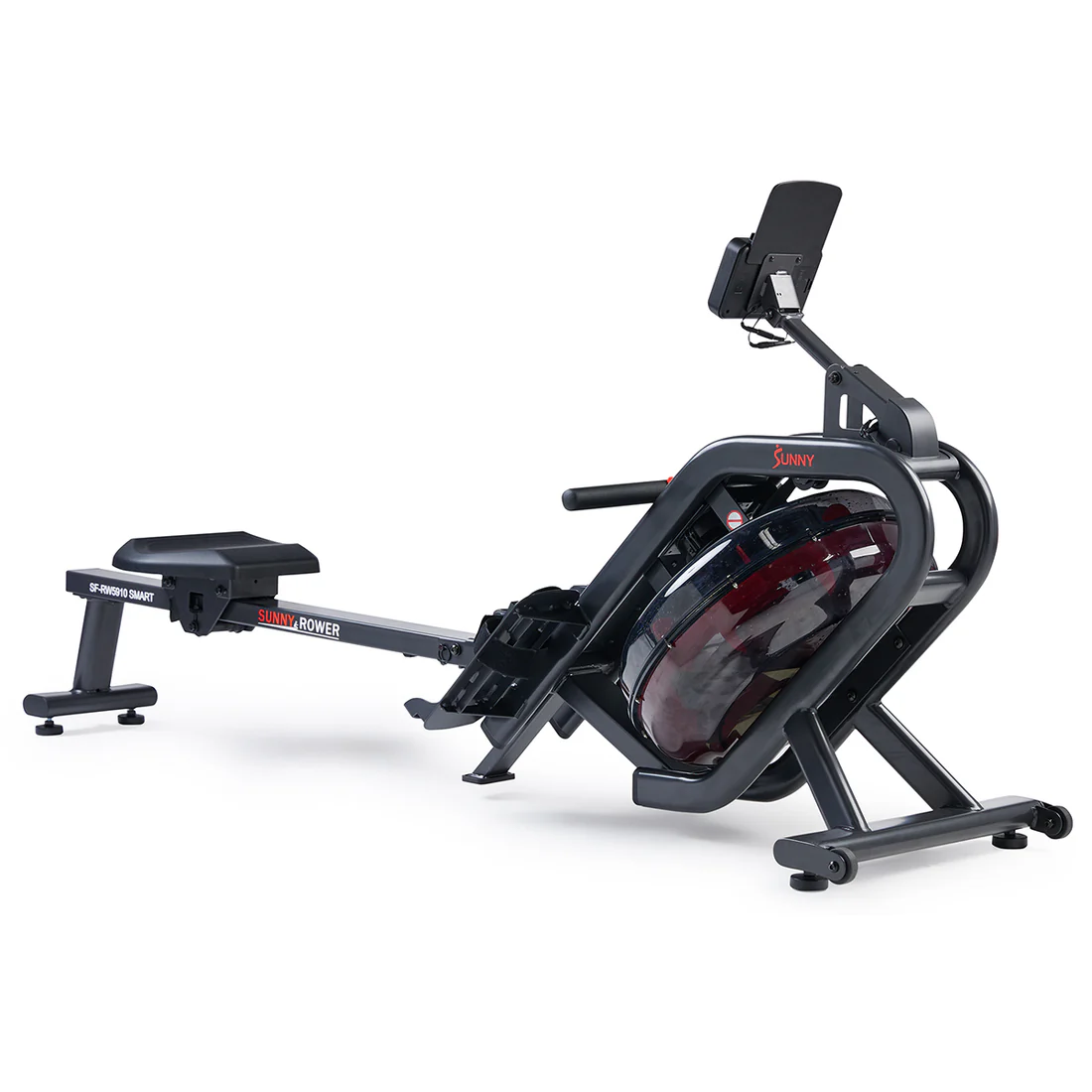

Leave a Reply